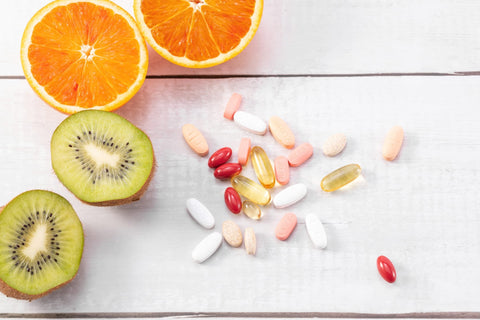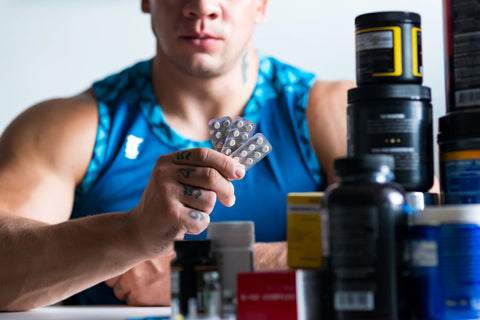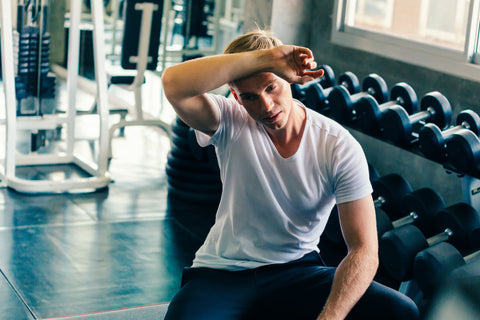Many fitness enthusiasts struggle to bulk up or gain some healthy weight. They hit the gym religiously, follow a strict workout plan, yet the scale seems stuck. This lack of progress is often due to the inadequate intake of vitamins and minerals necessary for muscle development and recovery.
Recognising and addressing this nutritional gap can make a huge difference in your workout routines. The right blend of vitamins supports muscle growth and enhances overall bodily functions necessary for health and vitality.
In this article, we take a look at the vitamins necessary for weight gain and how to add them to your daily routine.
Why Vitamins Matter for Weight Gain
Vitamins are commonly taken to support general health. However, they are also necessary for energy production, muscle repair, and metabolic regulation.
For instance, when you work out, your body requires the proper nutrients to convert food into energy and rebuild muscle tissue. The right vitamins optimise this process, thus helping you achieve your weight gain and muscle-building goals.
Additionally, vitamins help you recover faster and reduce muscle soreness after workouts. They support your body's healing processes and reduce inflammation, making it easier for your muscles to repair and rebuild.
Key Vitamins Essential for Weight Gain
Before starting any specific nutrients, it's important to recognise that each vitamin and mineral plays a unique role in the body. They work in synergy to support health and muscle development.
Vitamin D
Vitamin D supports muscle function and growth, which is important for those looking to gain weight. It enhances calcium absorption, which is necessary for muscle contractions and bone health.
Adequate vitamin D levels improve muscle strength and reduce the risk of injuries, allowing for more effective workouts and faster muscle growth. Additionally, vitamin D helps regulate the immune system and reduce inflammation, further supporting recovery and overall health.
How to Get Vitamin D:
- Sunlight: Spend time outdoors, as your body naturally produces vitamin D when exposed to sunlight.
- Food Sources: Eat fatty fish (such as salmon and mackerel), egg yolks, and fortified dairy products.
Vitamin C
Vitamin C is important for tissue repair and immune function. It aids in synthesising collagen, a protein that supports the structure of muscles and tendons. Proper vitamin C intake can reduce muscle soreness and speed up recovery after intense workouts.
Vitamin C also acts as an antioxidant, protecting muscle cells from damage caused by free radicals during exercise, which helps maintain consistent workout routines.
How to Get Vitamin C:
Vitamin C can be found in a variety of foods including:
- Oranges
- Strawberries
- Bell peppers
- Broccoli
- Spinach
- Kiwi
- Tomatoes
B Vitamins
The B-complex vitamins, including B1 (thiamine), B2 (riboflavin), B3 (niacin), B6 (pyridoxine), B12 (cobalamin), and folic acid, are crucial for energy production and metabolic processes.
They help convert food into energy, vital for maintaining a high level of physical activity and supporting muscle growth.
How to Get B Vitamins:
You can increase your vitamin B levels by consuming:
- Whole grains (such as brown rice and oats)
- Lean meats (chicken, turkey)
- Eggs
- Dairy products (milk, cheese)
- Leafy green vegetables (spinach, kale)
- Legumes (beans, lentils)
- Nuts and seeds (almonds, sunflower seeds)
Vitamin A
Vitamin A is essential for protein synthesis and tissue growth. Both these are crucial for muscle development and weight gain. Vitamin A also supports the maintenance and repair of muscle tissues and aids in the production of testosterone, a hormone that influences muscle growth.
Additionally, vitamin A contributes to a healthy immune system and vision, which are important for overall well-being and maintaining an active lifestyle.
How to Get Vitamin A:
You can find vitamin A in the following foods:
- Sweet potatoes
- Carrots
- Spinach
- Kale
- Liver
- Red bell peppers
- Mangoes
- Apricots
Vitamin E
Vitamin E is an antioxidant crucial in protecting muscle cells from oxidative damage caused by free radicals during intense workouts. This protection helps faster recovery and reduces muscle soreness, allowing you to train harder and more frequently.
Additionally, vitamin E supports immune function and skin health, both of which are important for overall well-being and maintaining a consistent fitness routine.
How to Get Vitamin E:
Some rich sources of vitamin E include:
- Almonds
- Sunflower seeds
- Spinach
- Broccoli
- Avocado
- Olive oil
- Peanuts
- Hazel nuts
Vitamin K
Vitamin K is important for bone health and helps in blood clotting. This can aid in recovery and prevent injuries during intense workouts. It also supports bone strength and density, making it crucial for those engaged in weight-bearing exercises.
How to Get Vitamin K:
You can find vitamin K in the following foods:
- Kale
- Spinach
- Broccoli
- Brussels sprouts
- Green beans
- Asparagus
- Kiwi
- Avocado
Vitamin B7 (Biotin)
Vitamin B7, known as biotin, is part of the B-complex vitamins supporting energy production. Biotin helps convert food into energy and supports the health of hair, skin, and nails, contributing to overall fitness and well-being.
How to Get Biotin:
Some biotin-rich foods include:
- Eggs
- Almonds
- Sweet potatoes
- Spinach
- Broccoli
- Dairy products (milk, cheese)
- Bananas
- Whole grains (oats, barley)
Magnesium
Magnesium is important for muscle function and energy production. It helps regulate muscle contractions and supports protein synthesis, essential for muscle growth and recovery.
Magnesium also aids in maintaining a healthy nervous system and electrolyte balance, which are important for overall physical performance and endurance.
How to Get Magnesium:
- Leafy green vegetables (spinach, kale, and Swiss chard)
- Nuts and seeds (almonds, cashews, pumpkin seeds, and sunflower seeds)
- Whole grains (brown rice, quinoa, and whole wheat)
- Legumes (Black beans, chickpeas, and lentils)
- Fish (Salmon, mackerel, and halibut)
- Avocados
- Bananas
Iron
Iron is an essential mineral for transporting oxygen to muscles. This helps energy production and muscle function. Adequate iron levels are necessary for maintaining stamina and endurance during workouts, which can help support weight gain and muscle-building goals.
Iron also supports the immune system and overall metabolic processes, contributing to overall health and well-being.
How to Get Iron:
Some iron-rich food sources include:
- Red meat (beef, lamb, and pork)
- Poultry (chicken and turkey)
- Seafood (oysters, clams, and shrimp)
- Leafy green vegetables (spinach, kale, and collard greens)
- Legumes (lentils, chickpeas, and beans)
- Nuts and seeds (pumpkin seeds, sunflower seeds, and cashews)
- Fortified cereals
How to Include These Vitamins into Your Daily Routine
Balanced Diet
You need to make sure your meals are well-rounded to get all the vitamins you need to gain weight. A balanced diet that includes a variety of nutrient-dense foods can help you achieve your fitness goals more effectively.
Meal Planning
Plan your meals so you can verify that each food contains the essential vitamins needed to meet your daily nutritional requirements. Make sure to include a mix of proteins, carbohydrates, healthy fats, and vitamin-rich foods.
Consult a Professional
Speaking with a nutritionist or healthcare provider can help you create a personalised plan that meets your nutritional needs. They can guide you on the right types and amounts of vitamins to include in your diet.
Use Supplements to Reach Weight Goals
If you find getting enough vitamins from food alone challenging, consider taking high-quality supplements. Supplements help fill nutritional gaps by offering a convenient and concentrated source of essential vitamins. It enables you to meet your daily dietary requirements without having to consume large amounts of food.
This is especially useful for those with dietary restrictions, busy lifestyles, or specific nutrient deficiencies.
Tips for Taking Supplements
Including supplements in your diet can be straightforward with the right approach. Here are some tips to help you make the most out of your supplement regimen:
- Always follow the recommended dosage prescribed by your healthcare practitioner or provided on the supplement packaging.
- Pair your supplements with a balanced meal with healthy fats for optimal absorption.
- Drink plenty of water to absorb the vitamins in your body.
- Take supplements regularly at the same time everyday.
Remember: Supplements should complement, not replace, a nutritious diet. Ensure you're eating a variety of nutrient-dense foods alongside your supplements.
Enhance Your Weight Gain Journey with Fenix Active Supplements
Fenix Active offers a range of high-quality supplements to fill nutritional gaps and provide a concentrated source of essential vitamins and minerals. These supplements can support your weight gain and muscle-building efforts by ensuring your body gets the nutrients it needs to function optimally.
Including Fenix Active supplements in your routine can enhance your performance, speed up recovery, and help you achieve your fitness goals more effectively.
Browse the Fenix Active vitamin shop and see the difference they can make in your overall health and weight gain efforts.



